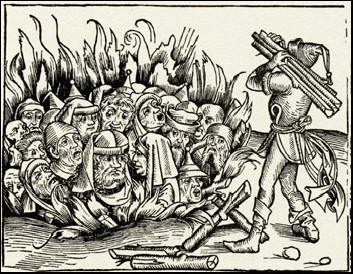
April 20 1298 – 7 Iyar 5058
Anti-Jewish riots broke out as civil war tore the Holy Roman Empire apart. Emperor Adolf of Nassau battled to subdue the rulers of several German princedoms, banded together under the leadership of Prince Albert of Austria. Rindfleisch (whose name means “butcher,” and was probably awarded him for his acts of cruelty) was one of Adolf’s commanders, who tried to divert attention from his failures on the battlefield by blaming his defeat on treasonous betrayal by local Jews. He added fuel to the fire with traditional accusations of Jewish desecration of communion wafers, resulting in the outbreak of pogroms against the Jewish population in Röttingen, Heilbrunn, Würzburg, Bamberg, Rothenburg and other towns. Jews had to choose between baptism and a cruel death at the hands of the mob. Chronicles of the period describe Jewish women leaping into the flames with their children rather than convert. The riots only subsided at the end of the summer of 1298, after Rindfleisch was arrested and beheaded by Albert, the victor in the civil war, who feared the knight’s rabble rousing could undermine his rule. The riots signaled the beginning of the collapse of the medieval Jewish center in Germany.
